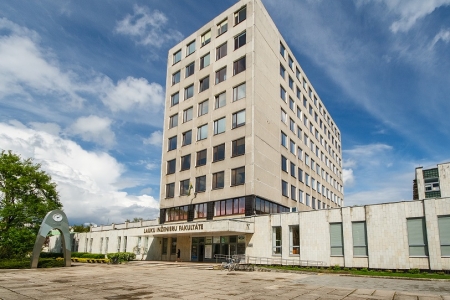Faculty of Environment and Civil Engineering

Faculty of Environment and civil Engineering is the second biggest faculty of the University, where new engineers-construction, environment and water management specialists, land surveyors, as well as landscape designers and planners, are prepared. At the faculty there are four scientific laboratories and two of them are located in advanced two storey premises, which allows the use of all the functional possibilities. Students at the Faculty work with up-to-date equipment, thus having an opportunity to comprehend causalities existing in the nature and to apply them in a particular task in their future work.
Environmental engineering sciences
Environmental and water sciences play a very important role in the life of every human being, since it is hard to imagine our daily life without pure water and air, without forests and without a research maintained infra-structure. Environmental engineering science deals with the theory of environment, humans and nature-friendly technology - ecotechnology, methods and practice of the realization of its main processes. It analyses conformity of technology principles to the development rules of nature ecosystems, raw materials and energy output, as well as the complex and rational use of physical-chemical processes. Students acquire knowledge about water supply, sewage treatment, land amelioration, waste management, the rational use of natural resources, construction of countryside roads, water management and hydrology. Environmental engineers -mostly work in the fields of water management and sewage treatment.
Civil engineering and landscape arhitecture
Civil engineering is one of the most important spheres in the Latvian national economy. The growing demand for real estate, especially for housing, promotes the rapid growth of construction in Latvia. Gradually, the prestigious image of civil engineers, landscape architects and planners in the eyes of society has increased, and the number of those who wish to study these professions has grown. After graduation they will be knowledgeable construction and landscape architecture specialists. Civil engineering specialists can work in production, building design, managing building technologies, designing building constructions, building hydro-technical constructions, reconstruction works of various buildings. Moreover, landscape architects can work out and improve regional and territorial plans, work in landscape reconstruction, re-cultivation, and develop preservation and cultivation plans.
Land surveying
The Faculty of Environment and civil Engineering has good reason to be proud both of its students and graduates - land surveyors, whose work is familiar to almost every inhabitant of the Latvian countryside, when solving questions regarding property, borders and inheritance. The growth in the demand for land surveying, cadastre and territorial planning specialists, results in an increase in the number of land surveying profession students who acquire knowledge of land surveying, cartography, photogrammetry, geographical information systems, real estate cadastre and evaluation, land law, territorial planning and land surveying design. Students strengthen their theoretical knowledge in the field and professional practices. Students are provided with geodesic instruments necessary for the practice, which give an opportunity to acquire skills of using the latest land surveying instruments and technologies. Graduates of the land surveying profession are employed by the State Land Service and other governmental institutions, land surveying and real estate appraisal companies, as well as town and regional municipalities.
Study programmes:
- Civil Engineering and Constructions
- Land Surveying and Management
- Environmental Science
- Landscape Architecture
- Landscape Architecture and Planning
- Water Management
- Environement and Water Management
- Environmental Engineering